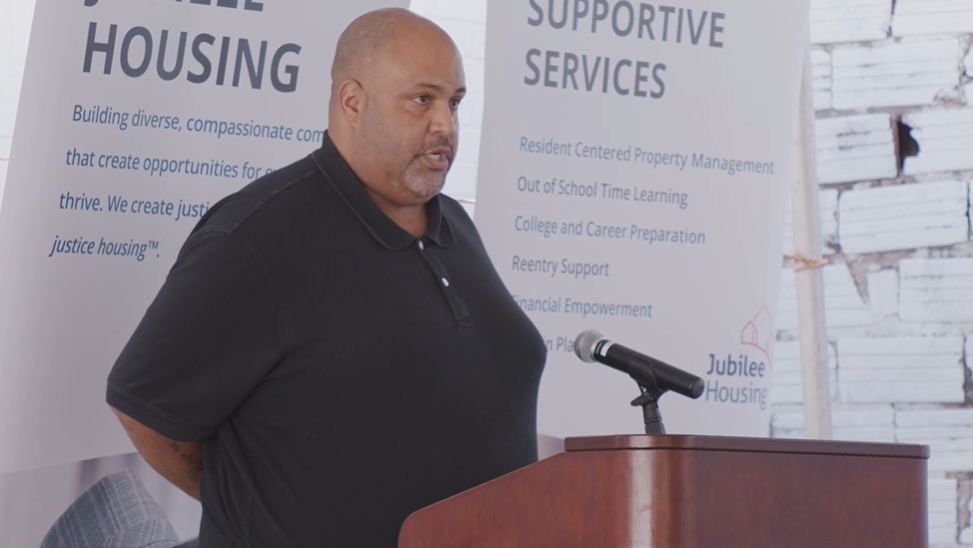For over 50 years, Jubilee Housing has worked to foster access to resources and opportunities, reduce the equity gap, and bring about justice through housing — Justice Housing. During this Jubilee Year, we have recommitted ourselves to some of our founding principles that are part of this biblical tradition: Filling Gaps, Breaking Down Boundaries, and Resetting the System. There is no better example of these values than Jubilee’s Reentry Housing and Services program and our advocacy for returning citizens through public policy and funding, a testament to our unwavering commitment to Justice Housing.
Jubilee has provided a supportive reentry housing program in the Adams Morgan area for twelve years, serving over 600 returning citizens without a single disruption to the neighborhood. The Reentry Housing Initiative provides transitional housing and wrap-around services for men and women who are looking to rebuild their lives in a supportive, drug- and alcohol-free environment. Jubilee currently operates two reentry homes, which serve up to ten women and ten men at a time, and a floor in another building dedicated to long-term housing. This month, we detail the founding of this program and talk to staff and program participants to get their perspectives.
50th Anniversary Stories
Turning Setbacks into Triumph: Insights from A Reentry Advocacy Leader and Role Model
Q&A with David Schultz
Meet David Schultz, the Director of Reentry Services at Changing Perceptions, a nonprofit organization dedicated to breaking the cycle of recidivism by equipping returning citizens with the tools and support necessary for successful reintegration into society. What sets Changing Perceptions apart is its leadership — composed of returning citizens who bring their lived experiences to the forefront. This unique perspective allows them to offer a more empathetic, hands-on approach, serving as a beacon of hope for those beginning or continuing their reentry journey. Through their example, they demonstrate that setbacks do not define a person and that success and reclaimed potential are within reach, regardless of past challenges.
In this Q&A-style article, David Schultz shares his insights as someone who has personally experienced reentry and now champions the cause, leveraging his experience to help others navigate their reentry journey. He also shares his deep connection with Jubilee Housing, offering his perspective as a supporter and collaborator with Jubilee’s Reentry Housing Initiative.
Please share a bit about your background and your work in reentry.
I was released from incarceration in June 2020, and exactly one year later, I graduated from the Georgetown University Pivot Program. During that period, I realized that I wanted to focus my efforts on helping others with similar experiences, which led me to work with a local nonprofit. Today, I serve as the Director of Reentry Services with Changing Perceptions, where we assist individuals returning from incarceration by helping them secure employment, housing, and other essential resources for a successful reentry. Recently, I was honored to be elected to the Board of Directors for The American Civil Liberties Union of the District of Columbia (ACLU-DC), where I use my life experiences to amplify the voices of those often unheard and to advocate for a fairer, more equitable District. Currently I’m the only returning citizen that is on the Board.
Additionally, I serve on the Leadership Council at the DC Reentry Housing Alliance, sharing my personal journey to foster empathy, understanding, and positive change in the reentry and housing processes. There are four of us on the advocacy side, and we all bring lived experiences. We are all returning citizens. It’s me, Samuel Buggs (Jubilee Housing Board Member), Monte Pollard (Executive Director at Changing Perceptions), and Latasha Moore (Assistant Director of the Georgetown Pivot Program). We’re supported by allies like Keisha Robinson and Jim Knight [Jubilee’s President & CEO], along with several consulting groups that work with us.
A goal of ours was to put forth legislation to be able to create a fund to get budgeted in fiscal year 2025 for justice-impacted housing. The legislation actually passed and we secured our line on the budget. That was a huge win for us. Now that we’ve achieved that goal, we’re regrouping to determine our next steps for the future.
One thing we are looking to focus on is more data, specifically live data for housing providers. For instance, by providing real-time or more frequently updated information on bed availability, we can offer a clearer view of how many spaces are currently open for individuals returning home from incarceration. This would enhance the efficiency of matching individuals with available housing, ultimately improving the chances for successful reentry and stability.
Can you share your experience with Jubilee’s Reentry Housing Initiative and what motivates you to recommend the program to others navigating reentry?
As a former justice-involved individual and participant in Jubilee’s reentry program and now as the Director of Reentry Services for a community-based organization that works closely with Jubilee, I can attest to the transformative power of this program. I’ve witnessed the pride and confidence of securing employment, finding stable housing, and rebuilding relationships with loved ones. I’ve also seen the impact that Jubilee’s reentry program has on the broader community. By providing a supportive and structured environment, Jubilee helps to reduce recidivism rates and promote public safety. The program also serves as a model for other reentry initiatives, demonstrating the effectiveness of a more holistic and community-based approach.
One particular moment that has had a significant impact on my journey is my privilege of speaking at Jubilee’s SUCCEED graduations. I’ve been able to share my personal journey and offer words of encouragement. I often tell them, “I spent over 15 years struggling on the streets, but no matter your age or where you are in life, you can reach a point where you decide to turn things around.” I struggled with my own battles including substance abuse, but I am now over nine years clean. I remember the defining moments when I had to make crucial decisions for my betterment. For me, a moment was prison. Then, surrounding myself with a positive, growth-oriented community helped me stay focused on my goals and continue my years of sobriety. Additionally, my faith and determination to create a better future for myself and my loved ones fueled my resilience. For many, entering a reentry program like Jubilee’s helps them gain clarity and start making the rational decisions.
These graduations are a testament to the hard work and perseverance of the participants who have successfully completed the program and serve as a powerful reminder of why reentry services are so crucial. Seeing and speaking to the graduates, many of whom faced challenges like my own, is inspiring. It underscores the power of comprehensive support and the strength of the human spirit. I’m moved by seeing the progress of individuals who may have started off slow but eventually excelled. Hearing their stories and celebrating their successes helps me refocus and stay motivated.
I continue to recommend Jubilee Housing because of my firsthand experience of the impact of their reentry program. I believe that everyone deserves a second chance and the opportunity to thrive, and Jubilee provides that support necessary to make that possible and in a community-driven environment that makes individuals feel welcomed. I referred my best friend, who had just been released from incarceration, to Jubilee. He became another success story after completing the program.
You’ve worked closely with Jim Knight, Gina Daye-Williams, and others on the Jubilee team. How have those collaborations influenced your perspective on reentry services?
Working with the dedicated team at Jubilee has deepened my understanding of the complex challenges faced by returning citizens like me. Collaborating with Gina Daye-Williams and Jim Knight has been incredibly rewarding. Gina’s ability to connect with residents has taught me to be more compassionate and empathetic, especially as I’ve walked in their shoes myself. I truly value her “meet them where they are” approach. Jim is always attending SUCCEED graduations, chatting with residents, and checking in regularly.
As I’ve taken on more community advocacy work, I’ve had the chance to work more closely with Jim, and it’s clear that he cares deeply about Jubilee, the community, and every person we serve. Whether he’s advocating for justice-impacted individuals or finding ways to expand affordable housing, Jim’s dedication is inspiring. These collaborations have reinforced my belief in the power of community and the necessity of humane, community-driven reentry services.
How did it feel to speak at the groundbreaking event for Jubilee’s new Ontario Place development, and what do the Ontario Place and KEB development projects mean to you and the community?
Speaking at the groundbreaking event for Ontario Place was both a humbling and empowering experience. It felt like a full-circle moment as I stood there, representing a success story like many others made possible by Jubilee’s support, the dedication of various community-based organizations and members, and our own personal resilience. These developments, [which will allow for the expansion of Jubilee’s reentry program], symbolize not only hope but also opportunity for countless individuals who will benefit from the affordable housing and supportive services.
Can you provide more details about your role as the Director of Reentry Services at Changing Perceptions?
At Changing Perceptions, we have a mentorship program that pairs individuals who have successful reentry journeys after more than a year out of incarceration with those recently released. This is crucial for many of our clients, who are often in IRAA or Second Look Act situations, meaning they have served lengthy sentences and have been recently re-evaluated for release.
I work closely with our case manager, who provides one-on-one support to clients, helping clients with employment, housing, social services, and other resources. Additionally, I collaborate with our community engagement specialist to make sure that we are out in the community and that individuals and entities know that we’re out here to help support them in any way that they need.
Having successfully navigated reentry myself, I understand the challenges and know the strategies and resources that can help others. For instance, many individuals are unaware of resources like free access to electric scooters and bikes through social services, or the transportation options available through food stamps and Medicaid.
Additionally, my personal journey allows me to relate to clients on a deeper level, using the same language and experiences to build trust. Both Monte and I have been through the system, so we provide honest, direct support, which helps clients feel more comfortable and reassured. Our experiences help us empathize and serve as an example of what’s possible, showing clients that they too can transform their lives.
What message would you like to share with those who are currently navigating reentry or just beginning their reentry journey?
To those navigating reentry, I want to say that you are not alone, and your past does not define your future. Surround yourself with positive influences, seek out supportive programs like Jubilee Housing and Changing Perceptions, and never give up on yourself. Your journey may be challenging, but with determination and the right resources, you can build a fulfilling life and make a positive impact on your community. As Maya Angelou once said, “You may encounter many defeats, but you must not be defeated. In fact, it may be necessary to encounter the defeats, so you can know who you are, what you can rise from, how you can still come out of it.”

